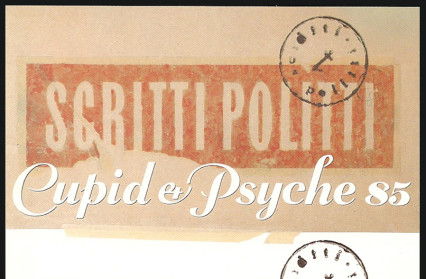In the latest in our series looking at the greatest albums produced by Welsh artists, we look back as Graham Tomlinson fondly remembers Scritti Politti’s seminal album, Cupid and Psyche ’85.
* This article was originally published in June 2015. *

The 10th of June this year marks the thirtieth anniversary of the release of Cupid and Psyche ’85 by Scritti Politti. The album has not had a recent re-release and unlike many records of a similar vintage, is yet to be given the full heritage makeover – the type that usually involves new sleevenotes and extra tracks, spread across a wallet-busting range of formats.
One can guess the reasons for this. Green Gartside, the South Walian Young Communist, fine art graduate and true believer in the power of pop, has been the one consistent factor in the history of Scritti Politti but is usually reluctant to discuss the music of the band’s past. This is explained in part by the fact that his experiences of fame and commercial success in the years that followed the release of Cupid and Psyche were unhappy ones. But perhaps the absence of a multi-disc reissue gives us a better opportunity to celebrate this complex wonder of a record as it approaches a significant anniversary; an album that improbably combines glossily produced music with lyrics deeply engaged in critical and theoretical enquiry. And an album which, in spite of that description, contains three UK Top 40 singles.
The route from Green’s earliest records to the mechanised perfection of Cupid and Psyche ’85 was a long and strange one. The songs of Scritti Politti in their first incarnation in the late 1970s are scratchy, intense affairs that evoke the environment of all-night, speed-fuelled debates in a Camden squat that produced them. This period of Green’s life and artistic endeavour was brought to an abrupt halt when he sustained a serious anxiety attack in early 1980, at which point he returned to Wales to recuperate. It was at this time that he discovered the rapture of black pop and soul music, and as a means of persuading his fellow band members that they should in future take this as their inspiration, Green wrote down his ideas. The resulting manuscript ran to thousands of words – the basis of a book, he later suggested, about the state and politics of popular music. The recorded outcome of this conversion was the first Scritti Politti LP, Songs to Remember, in 1982. The album has a meandering charm which never quite seems fully realised; Green closes the record with ‘The “Sweetest Girl”’, a gorgeous, reggae-lite tune that lopes over the beat of a home organ drum machine, but it would be Madness, not Scritti Politti, who had a hit with the song four years later.
Familiarity with these songs would have been no preparation for the single that emerged in February 1984 and which would provide a template for the new sound of Scritti Politti. Even the intro of ‘Wood Beez (Pray like Aretha Franklin)’ represented a huge leap forward in confidence: sledgehammer drums, keyboard stabs and bursts of white noise; a synth bass and precision-engineered hi-hat part; and a guitar riff that owes more to Shalamar than any of the post-punk bands Scritti Politti were usually bracketed with. And this was all in the first sixty seconds. When the vocal came in, Green’s voice was recognisable from earlier records but almost nothing else was. The difference, clearly, was a budget that allowed for a lot of studio time, but also the investment of some serious technological expertise. Green’s new bandmates were David Gamson (keyboards) and Fred Maher (drums), two New Yorkers who revelled in the newfound freedoms of digital recording and sampling, and the single was produced by Arif Mardin whose work with – yes – Aretha Franklin and latterly Chaka Khan (‘We Can Work It Out’ and ‘I Feel For You’) Green had admired.
Two more singles were released in 1984 – the brilliant ‘Absolute’, also produced by Mardin, and then ‘Hypnotize’ – before Cupid and Psyche ‘85 came out the following summer. The distance Green had travelled from those first releases is hinted at in the graphic design of the album’s cover, with the band’s name appearing twice on what might be old luggage labels, each of them stamped with a Scritti Politti postmark. On the inner sleeve, Green, Maher and Gamson are photographed in front of the mirrors and basins of a luxury bathroom. If the album’s title recalled Antonio Canova’s marble sculpture almost exactly two hundred years earlier of the mythical lovers’ Cupid and Psyche, here the same polished stone appears in the high-end finish of an upmarket hotel washroom.
How very 1980s. And the sound of the album is no less redolent of the period. Let the listener beware: there are keyboard bends and there is heavily processed rock guitar, and in one place there may even be a steel drum sample. But the glory of the record is its musical and rhythmic sophistication; not every LP released in 1985 sounded as exciting as this. Green and his collaborators likened the process of assembling the tracks to the workings of a Swiss watch. Individual parts of only two or three notes accent and punctuate the vocals, instruments leap from one speaker to the other, and hidden melodies are revealed only on repeated playbacks. It’s clearly the result of hours spent at the mixing desk but the hard work is made to sound effortless.
And then there are the words. In 1984 Green had told the NME that he was ‘steeped in language’ and the evidence of this is scattered across the album’s lyrics. There are references to love letters left incomplete, margins of error, pages torn out of rule books, and (on ‘Lover to Fall’) ‘a new hermeneutic’. Even the copyright for the album is credited to a company called Jouissance Ltd. Green was happy to expound on all this in interviews at the time of the record’s release. This is how he explained the origins of album opener ‘The Word Girl’ to Sounds:
I was taking stock of all the lyrics of the songs for the new album and, lo and behold, in every song there was – this girl, or that girl. It seemed a good idea to show awareness of the device being used, to take it out of neutral and show it didn’t connote or denote certain things. It was important to admit a consciousness of the materiality of referring to ‘girls’ in songs.
It’s fair to say that you didn’t get this kind of thing from Billy Idol. The sheer weight of references and allusions on the album should suffocate it, but Green had by this time found a surprisingly light touch with a lyric, and coupled with the inventiveness of the music, ensures that it’s anything but a deadly listen. It doesn’t matter if you don’t know that in the song ‘Small Talk’ the line ‘If a thing’s worth doing / It’s worth doing badly’ is his attempt, as he told another interviewer, to summarise an idea of the philosopher A N Whitehead. And most people who bought the album wouldn’t have had a clue that the photo on the back cover is inspired by Marcel Duchamp’s unused image for the cover of Vogue depicting a piece of meat wrapped in cloth. What counted were the songs, and there was plenty of evidence that people understood those well enough as the album reached number 5 in the UK. In the chorus of ‘Perfect Way’, the band’s biggest hit in America, Green sings that he’s found ‘a perfect way / To make the girls go crazy’. If you want proof of that, just go online and witness the screams that greet his appearance on Mike Read’s Pop Quiz.
Sadly, the sheen would eventually wear off Scritti Politti’s pop crown. The next album, 1988’s Provision, has many of the sonic devices and lyrical complexity of its predecessor, but little of its beauty, with the exception of the exquisite ‘Oh Patti (Don’t Feel Sorry for Loverboy)’ and an accompanying trumpet solo from Miles Davis. The album had taken a long time to make and Green sounds tentative on much of the record, his voice mixed curiously low in places as if even he doesn’t completely believe in it. Of course, we know now that the attention that came with the popularity of Cupid and Psyche had not brought Green much pleasure, and he had not been able to maintain the ironical distance from the corporate side of the music industry that he had envisaged. At the time of the release of 2006’s White Bread Black Beer, he said of the earlier period that success had felt as bad as failure. After Provision, he again fled to Wales and it would be another eleven years before the release of the eclectic Anomie and Bonhomie.
Cupid and Psyche ‘85 remains a hugely satisfying listen, and one which possesses magic that has outlived the particular time and place in which it was made. I bought the album when it first came out – my copy of the LP still bears the £5.99 price sticker from Andy’s Records in Norwich – and though I was a gauche, suburban 15-year old, even I could tell that its production values represented some new high-water mark and that the lyrics were a playful, brainy delight. I still smile at the line ‘There’s nothing I wouldn’t do / Including doing nothing’ in ‘Wood Beez’, but if there’s a French poststructuralist lurking behind it, I couldn’t tell you who it was.
These days, Green is Artist in Residence at Faber, an occasional broadcaster on 6Music, and in a rare recent musical outing has provided a string arrangement to a song on the new Hot Chip album. What he thinks about Cupid and Psyche ‘85 is anyone’s guess. On Scritti Politti’s occasional excursions as a live outfit, you might be lucky enough to hear a performance of ‘Wood Beez’ – which is more than you would have done in the mid-eighties as the band didn’t tour then. Playing the song live suggests at least that Green might have made his peace with the album. Even if we can’t quite persuade him to blow out the candles on the cake as the record approaches its thirtieth birthday, I hope he retains a little pride in his achievements. As he sings during the fade-out of ‘Hypnotize’, the last track on the album, it might be ‘so hard to tell you / That I love you’, but that really shouldn’t stop you from trying.
Cupid and Psyche ’85 by Scritti Politti is available here.
Graham Tomlinson is an avid contributor to Wales Arts Review.
For other articles included in this collection, go here: The Greatest Welsh Album












